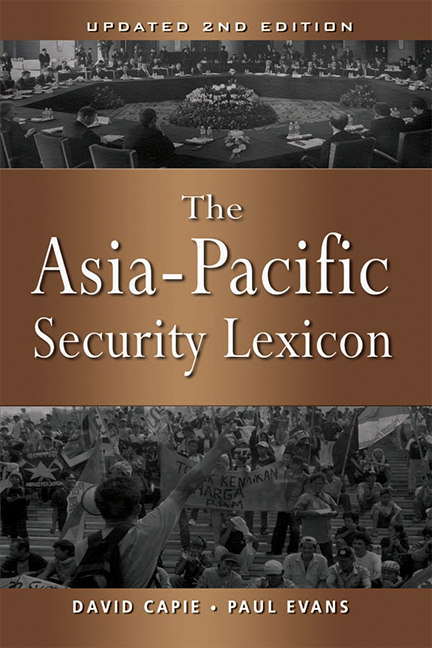Book contents
- Frontmatter
- Contents
- Abbreviations
- Introduction to the Second Edition
- Ad Hoc Multilateralism
- A la Carte Multilateralism
- The “ASEAN Way”
- Balance of Power
- Bilateralism
- Coalition of the Willing
- Coercive Diplomacy
- Collective Defence
- Collective Security
- Common Security
- Comprehensive Security
- Concert of Powers
- Concerted Unilateralism
- Confidence-Building Measures
- Confidence- and Security-Building Measures
- Constructive Intervention
- Cooperative Security
- Engagement
- Flexible Consensus
- Human Security
- Humanitarian Intervention
- Middle Power
- Multilateralism
- Mutual Security
- New Security Approach
- Non-Traditional Security
- Open Regionalism
- Peaceful Rise
- Pre-emption and Preventive War
- Preventive Diplomacy
- Security Community
- Terrorism
- Track One
- Track One-and-a-Half
- Track Two
- Track Three
- Transparency
- Trust-Building Measures
- About the Authors
Preventive Diplomacy
Published online by Cambridge University Press: 21 October 2015
- Frontmatter
- Contents
- Abbreviations
- Introduction to the Second Edition
- Ad Hoc Multilateralism
- A la Carte Multilateralism
- The “ASEAN Way”
- Balance of Power
- Bilateralism
- Coalition of the Willing
- Coercive Diplomacy
- Collective Defence
- Collective Security
- Common Security
- Comprehensive Security
- Concert of Powers
- Concerted Unilateralism
- Confidence-Building Measures
- Confidence- and Security-Building Measures
- Constructive Intervention
- Cooperative Security
- Engagement
- Flexible Consensus
- Human Security
- Humanitarian Intervention
- Middle Power
- Multilateralism
- Mutual Security
- New Security Approach
- Non-Traditional Security
- Open Regionalism
- Peaceful Rise
- Pre-emption and Preventive War
- Preventive Diplomacy
- Security Community
- Terrorism
- Track One
- Track One-and-a-Half
- Track Two
- Track Three
- Transparency
- Trust-Building Measures
- About the Authors
Summary
Coined by the second Secretary-General of the United Nations, Dag Hammarskold, in 1960. According to Simon Tay, the concept is based on public international law, in particular the United Nations' goal to “take effective collective measures for the prevention and removal of threats to peace” set out in Article 1 of the United Nations Charter. In the context of the Cold War, Hammarskold saw preventive diplomacy principally as a means of keeping regional and local conflicts isolated from the superpower stand-off. He urged the creation of hotlines, risk-reduction centres, and transparency measures with the goal of avoiding “action by one or other of the superpowers that might lead to escalation and nuclear confrontation”.
As it is used today, however, the concept of preventive diplomacy is more closely identified with another United Nations Secretary-General, Boutros Boutros-Ghali. In his 1992 book, An Agenda for Peace, Boutros-Ghali revived and reconceptualized preventive diplomacy for use in the post-Cold War world. He defined the concept as “action to prevent disputes from arising between parties, to prevent existing disputes from escalating into conflicts and to limit the spread of the latter when they occur”. His report distinguished preventive diplomacy from other types of diplomatic action, including peacebuilding, peacekeeping, and peacemaking, because of its emphasis on solving disputes before they turn into actual conflict. According to one description, preventive diplomacy differs from ordinary diplomacy in that “it signifies active, rather than reactive, responses to situations that threaten peace. Its scope is more ambitious and immediate.” Preventive diplomacy remains a strongly contested term, however, and as one report published in Singapore on the subject noted, “there is no consensus on the meaning, scope and purpose of [preventive diplomacy] or how it would apply to security-related issues in the Asia-Pacific region.”
A key area of dispute about the meaning of preventive diplomacy revolves around the question of the means to be used to prevent conflict from breaking out or spreading.
- Type
- Chapter
- Information
- The Asia-Pacific Security Lexicon (Upated 2nd Edition) , pp. 199 - 210Publisher: ISEAS–Yusof Ishak InstitutePrint publication year: 2007



